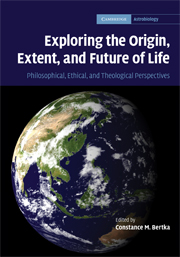 Exploring the Origin, Extent, and Future of Life
Exploring the Origin, Extent, and Future of Life from Part III - Future of life
Published online by Cambridge University Press: 29 December 2010
Why should we care about Christian ethical perspectives on astrobiology?
Why should we care about a Christian ethical perspective on astrobiology? After all, the world is becoming an increasingly pluralistic society, with a rich plethora of different religious and philosophical perspectives. Why should we care about what Christians or any other religious group thinks about the ethics of space exploration? For that matter, we may question whether there should be any ethical concerns about astrobiology or the ethics of space exploration at all.
We stand on the brink of an exciting new age in space exploration and science. Already, we have discovered extrasolar planets in our galaxy, launched several very successful robotic missions to Mars, and lifted our gaze above the clouds of Earth through the Hubble and Spitzer space telescopes. This promises to be just the beginning, a foretaste of what is yet to come! In the next twenty years, we could well discover evidence of simple, microbial extraterrestrial life in our solar system – if it exists. In addition, NASA has enterprising plans for the exploration of space beyond our own solar system. The discovery of advanced, intelligent extraterrestrial life remains an intriguing possibility. At the heart of NASA's research strategy is astrobiology, a newly emerging science that will study the origin, extent, and future of life – both in space and on planet Earth. At last, through astrobiology humans are ready to make that gigantic leap off our small planet and become a genuine space-faring species.
To save this book to your Kindle, first ensure no-reply@cambridge.org is added to your Approved Personal Document E-mail List under your Personal Document Settings on the Manage Your Content and Devices page of your Amazon account. Then enter the ‘name’ part of your Kindle email address below. Find out more about saving to your Kindle.
Note you can select to save to either the @free.kindle.com or @kindle.com variations. ‘@free.kindle.com’ emails are free but can only be saved to your device when it is connected to wi-fi. ‘@kindle.com’ emails can be delivered even when you are not connected to wi-fi, but note that service fees apply.
Find out more about the Kindle Personal Document Service.
To save content items to your account, please confirm that you agree to abide by our usage policies. If this is the first time you use this feature, you will be asked to authorise Cambridge Core to connect with your account. Find out more about saving content to Dropbox.
To save content items to your account, please confirm that you agree to abide by our usage policies. If this is the first time you use this feature, you will be asked to authorise Cambridge Core to connect with your account. Find out more about saving content to Google Drive.